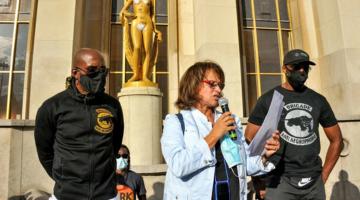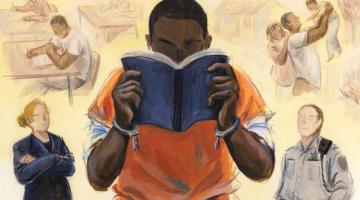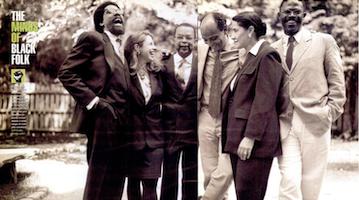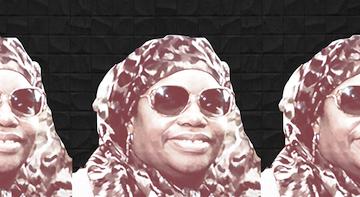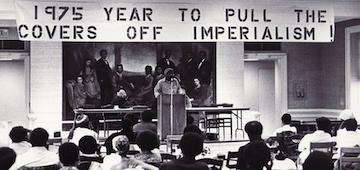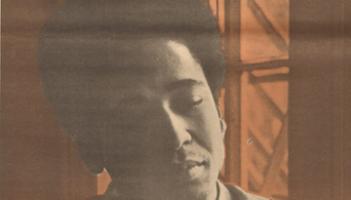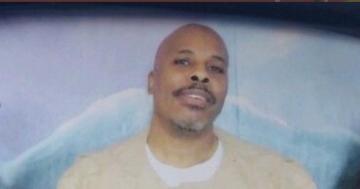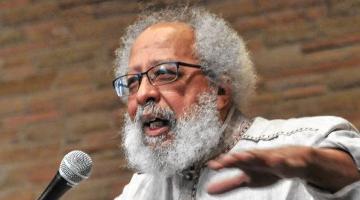“But I refuse to excite myself about my past, or our future. I have simply taken up a task and I am preparing myself for its execution. I absolutely refuse to give way to emotional involvement or any undisciplined or dogmatic beliefs. Life is too uncertain, and dogmas and beliefs are the product of this sick man who now transgresses against us and the world. If I can bend circumstances to my will I succeed.
If not — I'm off the cycle”
George Jackson, Soledad Brother
Roberto Sirvent: A lot of your theoretical work focuses on critiquing the counter-insurgent nature of academic Black studies. Can you share when you began to observe and analyze this mode of counter-insurgency?
Tea Troutman: My critique of counter-insurgency in political culture, academia, and beyond is always primarily concerned with matters of compromise and circulation. I have been a community organizer since 2014 and in graduate school since 2016. My experience in the academy, the sphere of public affairs, and in radical social movements, made clear that a common anxiety around “the negro question” persists now, as it has since empire first contemplated legal manumission and emancipation. Its incompatibility with neoliberal paradigms of inclusion in the Post-Ferguson, Trump-era in particular, prioritizes circulating on the marketplace of ideas work from negroliberal factions of Black Studies discourse—-those that are state-aligned and in the service of the preserving and expanding participation in imperial “democratic” order—that explicitly quell revolutionary violence through an insistence on nonviolent civic duty in the face of state terror. At the same time, the waves of spectacular violence, summer uprisings, and hypervisible social justice organizing has increased demand for market-approved work from its radical, leftist counterparts that offer romanticism of black resistance and the idea of a revolutionary political culture as the alternative.
In my time as an organizer, an urban planner and public polic(e)y analyst, I have been a part of many efforts organized in response to matters of black suffering, that in the name of “justice,” “solutions,'' desirable futures, and other pragmatic concessions, mobilized entire campaigns for social equity that circulated state and capital approved language, metrics, desirable leaders and resistance strategies that kept our movement compliant with all efforts to expand and stabilize white power’s hegemony. Duty—be it civic fidelity to the state, or captivity to tradition and movement—is always the compromise here. In the same way that radical assertions like “the revolution will not be funded” circulates a critique of the non-profit industrial complex associated with a neoliberal “pop” political culture that inhibits violent anti-institutional insurgency in favor dreams of and demands for alternatives, the field insists on a longue duree of (captive) resistance as the most capacious defense strategy against the terror of white power, and its organizing capacity, that is to me equally insufficient.
My critique of counter-insurgency is one of black (political) culture. I, like many scholar-organizers, find the 1960s-70s instructive as a period of upheaval, transition, and political plurality, wherein the triumph of the “Black Power” political cultures that flourished in the wake of Watts ‘65 was essential in structuring ne(gr)oliberal order that followed. The communal response to the Watts rebellion was the Watts Summer Festival and Parade, and a political program centering the cause of black self-determination through the identification with a black political culture. This pattern of our opting for Black Culture—or, as Hortense Spillers suggests, the idea of it—gives black insurgency a cause for rebellion that foregoes adequate consideration of antiblack terror and revolutionary violence in thought and praxis. Movement building, the circulation of compliant “radical” thought, and the social justice changemaker constitute the political culture(s) that keep insurgency neutered and captives bound in anticipation of the “right conditions” for freedom.
What are some ways we see this counter-insurgency play out in college classrooms, academic conferences, social media, and the book publishing industry?
As I noted in my previous response, I pay attention to the value generated by the ideas, frameworks, literary canons, radical figures, celebrity activists, contemporary thought leaders that are strategically circulated to (re)produce and maintain order. In the classroom and conference spaces, the politics of who and what makes the syllabus, which papers are called for, and which limits are overlooked in favor of the dominant social life-affirming projects in black thought are an example of this.
Beyond the academy, I take social media seriously as a site of counter-insurgent circulation. In 2020, I began working as a social media manager for Wear Your Voice magazine, joined Clubhouse, regularly recorded the “In the Middle'' YouTube podcast and spent more time organizing across platforms, as the pandemic and uprisings required I transition into a digital organizing role. I noticed how the state’s demand for a return to order leveraged the 2020 moment, as popular culture coalesced around the rhetoric of an overdue racial reckoning, which in turn required mainstream movements be built in compliance with the neoliberal notion of (racial) progress as unifying social inclusion. At the same time, 2020 propelled the hyper production and circulation of political education materials intended to meet the demand of the moment with alternative political frameworks, historical analyses, and narratives of community action as radical, yet pragmatic—and therefore compromised—solutions.
Despite this increased production, circulation, and mass engagement with political radicalism from the furthest poles right to left on the political spectrum, we watched increased plurality and lack of political consensus stagnate the left, the center scramble for legitimacy via an overemphasis on an electoral strategy aimed at the salvation of democracy, and the right seize the crisis to advance its fascist cause. In retrospect, I reflect on that moment of upheaval and am most interested in the regression of popular political thought and action. It is no longer merely a question of who and what gets circulated, but also what is lost, airbrushed, and redeemed in that circulation? The online discourse that grapples with quotidian instances of homophobia, transphobia, state violence, fascism, colorism, fatphobia and disability seem to (re)produce as they double down on in their insistence on maintaining hegemony, despite the mass circulation of radical interventions.
In retrospect, I am most intrigued by the moment’s failure to deliver the sustained mass action that felt like the only logical solution to the deepening deprivation caused by the pandemic and the uprising. What 2020 clarified is the ways in which “radical thought” from prominent leftist individuals and formations, in their emphasis on resistance strategies, necessarily reduce the stakes of imperial expansion and state repression structured by global anti-black violence, in favor of a plurality of strategies in movements built to divert use of revolutionary force.
You often talk about our attachment to “sacred revolutionary figures” and how “the space they take up in movements, thought and tradition are acts of counter-insurgency.” What are some recent examples of this phenomenon? And why is it so common in leftist circles to criticize someone like you for pointing out these grave dangers to revolutionary struggle?
If the years I have spent engaged in movement building and anti-state resistance has taught me nothing else, it is the importance of practicing non-attachment to political causes, figures, spaces, and comrades that impede my own political growth, and stifles the momentum of the broader movement. My essays published in the spring for Scalawag’s Captive Maternal Roundtable and Week of Writing: Stop Cop City series reflect heavily on the matter of attachment. My contribution to the latter is critical of the attachment black people in particular and leftist organizers in general have to “place,” while the former critiques the bondage to political causes and movements. In both essays, I attempt to grapple with the matter of political culture as pop culture and the function of antiblack violence and counter-insurgency in the generation and circulation of both.
I conclude the editorial framing for the Cop City series, “Forever I Love(d) Atlanta” with the following:
“In our undying love for The Culture, we auto-generate counter-insurgent repressive strategies and do the work for the state. The time to face revisionism and counter-insurgency in our movements, their strategies, and in our consideration of revolutionary thought is now. The demand to defend the forest against the construction of Cop City is not a ‘civil’ ask but an affirmation that this is war and the people—as anti-state terrorists—are always positioned on the defensive. The plantation’s expansion is always predicated on the ability to maintain the order by keeping the captive bound and accounted for. It expands only as its means of capture and containment do. The rebels who opt for the end of The City as the only viable means of stopping Cop City, APigD, DIckens and every mayor thereafter must therefore recognize that severance from The Culture and its (re)production is to break all ties with the idea of a city to come.”
Since my “retirement” from frontline organizing in 2020, the rampant revisionism in our Ferguson-BLM era movements has been my focus. In the time since, I have held dialogue spaces online with my closest friends, Da’Shaun Harrison, RAW Wilcox, Jordan Mulkey, Simi Muhumuza, and Justin James that attempts to intervene in popular consensus surrounding the interpersonal, intramural, and global antagonisms symptomatic of the way antiblackness structures Desirability. Libidinal circulation functions in a manner that compromises black insurgency by usurping revolution in favor of movements propelled by their pursuit of causes intended to deliver non-violent, inclusive, redemptive, and otherwise desirable futures. The political conversations held at this time revealed not only a general stagnation in the mass consensus on revolutionary thought and action, but a rightward shift across the left political spectrum, which reflects the conservative, pragmatic political program insisted upon in popular Abolitionist literature and the movement (mis)leaders who author it. As a collective, we leveraged online spaces like Clubhouse, Instagram, and Twitter to publicly indict Patrisse Cullors, Shaun King, Tamika Mallory and other celebrity activists, who at the time worked overtime to leverage the uprising and pandemic to advance reformist, Negroliberal electoral-centric political agendas as the path forward from violent uprising. It was our work to seek accountability for Samaria Rice, the mother of Tamir Rice, and “the other Mothers of the Movement,” that escalated into a movement-wide call for accountability from the larger BLM movement. That moment of anti-revisionist action against the movement’s most prominent leaders and conservative political shift culminated in organizing “Summit for Accountability in Social Justice Movements” with the support of Joy James and Black Power Media, as well as Imani Perry’s profile of Samaria Rice, “Stop Hustling Black Death.”
I have a general interest in Marxist anti-revisionism, and I find Harry Haywood and Aimé Césaire’s critiques of their respective communist parties particularly instructive on the matter. Haywood’s “The Degeneration of the CPUSA in the 1950s” (1976) reflects on the revisionism in the CPUSA in the period of destalinization—Nikita Khruschev’s rise to power in the wake of Stalin’s death which led to a rightward shift in Soviet politics in its move away from Stalinism-as-revolutionary communist politics—in which he was most critical of the party’s break with a revolutionary position regarding black liberation in the south. This position, which called for Black self-determination and land sovereignty in the South, was abandoned along with communist revolution as the party took a revisionist move towards a peaceful transition to social democracy in the US. Haywood wrote “For a Revolutionary Position on the Negro Question” in 1957, two years prior to the CPUSA officially removing black southern self-determination from its political strategy, and his expulsion from the party. Césaire raised a similar critique regarding the negro question and global solidarity in his 1956 letter of resignation to French Communist Party. In “Letter to Maurice Thorez,” Césaire speaks to the crisis of revisionism facing his party in the age of destalinization. His asserts: “In any case, it is clear that our struggle–the struggle of colonial peoples against colonialism, the struggle of peoples of color against racism—is more complex, or better yet, of a completely different nature than the fight of the French worker against French capitalism, and it cannot in any way be considered a part, a fragment, of that struggle.” Both Césaire and Haywood spared nothing in their critiques of specific party members and their diagnoses of the political conundrum.
An afropessimist reading of both texts reveals much about the irreconcilable differences between the unified nature of party politics and radical leftist political movements and the “negro question.” I interpret the “negro question,” or “the negro problem” as stand-ins for that (black) violence radical movements and thought cannot authorize, given the stakes of preserving the order maintained by the movement, the party, the org, and the doctrine. Given this, I do not think anybody contributing to revolutionary thought or struggle, any pop culture figure or event, and any mainstream political action is above critique. As I tweeted before in response to the virulent backlash to critiques of Angela Davis, revolutionary “faves” pose the same counter-insurgent threat to movements and revolution as the celebrities and mainstream politicians that are always the subject of debate and critique. Everybody is implicated, nothing is sacred, nobody is safe and no “fave” should be spared given the stakes of war.
You’ve written that “This is war” serves as your grounding statement and context for critique and organizing. Which intellectuals and movements inform the way you theorize “war”, and how can this framing help people become more observant (and critical) of the counter-insurgency tactics of academia and the state?
I draw on a number of political movements and intellectuals in my formulation of war according to instructions laid out in texts on guerilla insurgency and armed struggle in anti-colonial warfare. Fanon, Mao, Lenin, Ho, Giap, Che, George Jackson, Russell Maroon Shoatz, Walter Rodney, Jamil Al-Amin, and Kwame Ture are who I engage the most in this arena. Beyond this, I am an Afropessimist and find Frank Wilderson, Jared Sexton, Patrice Douglass, Zakiyyah Iman Jackson, and David Marriott’s work have all been indispensable in clarifying the role of captivity, black suffering, antiblack violence, and libidinal desire play in structuring war, aggression, sovereignty, revolution and “self”-determination. Considerations of “war” in my work is also deeply indebted to the political-intellectual community I keep, as the daily conversations shared with Da’Shaun, Jordan, RAW and Simi, as well as Jaeden Johnson, Sherronda J. Brown, Joshua Reed, and John Gillespie are essential to my political growth.
In “Airbrushing Revolution for the Sake of Abolition” Joy James closes her essay with the reminder that “war is not a metaphor,” and I think we all need to sit with that as a daily reminder of the task at hand. To take war as our reality requires recognition of state and extralegal mob violence for the aggressions that they are. Earlier this summer, I had the opportunity to co-edit Scalawag’s annual Abolition Week series. This year’s theme “The Bars We Can’t See,” published contributions from currently and formerly incarcerated folks in America and Palestine that gave detailed accounts of prison conditions and the everyday violence of life under imperial-settler dominance. Our Palestinian contributors used the language of aggression to mark the temporality of israeli settler violence, and I think given the borderless nature of our global war zone, we should all adopt that language. We are all surviving in between aggressions.
Perhaps a turn to the language of war might then shift our analysis of the present conditions and activate counter-insurgency strategies that adequately respond to the captive’s only demand: to be liberated. I take war seriously, and I spend a fair amount of my time studying our opps and their war strategy. Readings on the 19th century post-bellum South, between the end of the Civil War and the first World War aid in tracing the origins, reproduction, and modernization of white mob violence, or as I often call it, “klan terror,” that is the blueprint for the fascist violence that continues to expand and fortify in our contemporary moment. I think we should all return to the work of Ida B. Wells-Barnett and read her for the war reporter that she was in the time of lynch mob rule. I have been in quite the white power rabbithole this summer and find histories of the contemporary white power movement, the rise of the Klan in 20th century cities, global white power movements, and armed + violent anti-fascist counter-terror strategies a vital contribution to my political education.
I quasi unretired this summer and hopped back on the ground to lend capacity to the Cop City movement. In short, the return to movement-building affirmed my reason for leaving: this is war and a failure to engage the moment as such yields too many casualties in struggles that fail to end state predation in favor of state-compliant concessions. I am of the belief that the end of Cop City must mean the end of Atlanta. It must also mean the end to an urban order, and at the highest scale, the end of this predatory world and those which come after. When the state murdered Comrade Tortugita, Atlanta should have become a global model for the people’s seizure and full shut down of a city. The tireless work of the organizers in the city and the city hall actions indeed aided in making the Cop City movement a global cause worthy of studies in state violence and of course, solidarity, but the vote “no” should have been anticipated and the city shut down accordingly. I commend my comrades, but the casualties of these struggles against the city—Marshall Rancifer, Haroun Shahid Wakil, Mattie Jackson, and Bertha Darden among many—demand we take it further.
George Jackson’s directions are clear on the objective of the urban guerilla rebel in fascist warfare: one must fight state terror with terror. It is Black August in a time that perhaps more than ever begs we return to the texts and take them seriously. Jackson opens Blood in my Eye, with what it means psychically to engage in urban warfare, “we must accept the eventuality of bringing the USA to its knees; accept the closing off of critical sections of the city with barbed wire, armored pig carriers crisscrossing the streets, soldiers everywhere...doors being kicked in, the commonness of death.” In the same text, he issues the guerilla’s marching orders:
“The objective, I repeat, of the destruction of a city-based industrial establishment and its protective forces is to create perfect disorder, to disrupt all of their interacting processes that allow them to produce and distribute goods, and this can be done from within the process much more easily than from without. Really, there is no possibility of an established government ever overcoming a determined internal enemy.”
I believe it is time to let go of the attachment to “home,” and fear of being identified as a terrorist, an insurgent, or part of the gang. We don’t fight tradition with tradition, heroes with other heroes or mythology with mythology. Our Lost Causes are just as violent as theirs. We fight white power, its force of anti-black insurgency, and its terms of order with (black) revolutionary violence. Anything less is in direct alignment with the revisionist position that insists on a reduction of the stakes, a deferral to captive resistance and therefore acts as impediment to what is to be done.
How can BAR readers support your work?
Read my work and the rest of the phenomenal contributions we’re publishing at Scalawag and follow the publication’s main accounts, @scalawagmag on Twitter and @scalawagmagazine on Instagram. I am the new Salt, Soil and Supper editor, and I am currently accepting pitches broadly focused on climate justice and grassroots resilience strategies in the south for our fall almanac special issue. The call for pitches is available here or pitch me directly via email at tea@scalawagmagazine.org. Be sure to follow @saltsoilsupper on Instagram and Twitter for updates.
Tea Troutman (they/them) is a retired community organizer, urbanist, and cultural critic from Atlanta, GA. They are currently the Salt, Soil and Supper editor at Scalawag Magazine. Their writing and research interests include Marxist urban theory, Atlanta and the New South order, Black social movements, and urban music cultures. They can be found online on Twitter @trapteas and Instagram at @criteaque.
Roberto Sirvent is editor of the Black Agenda Report Book Forum.

